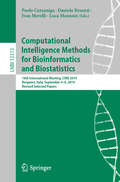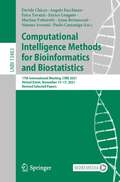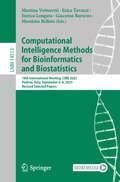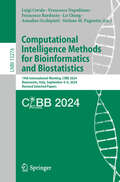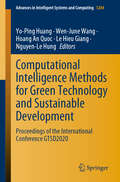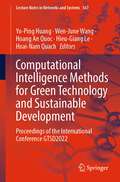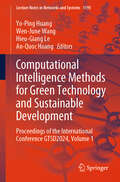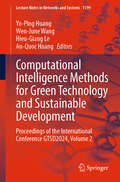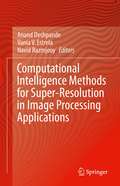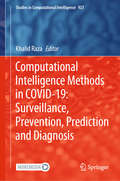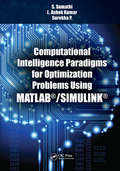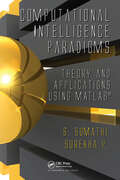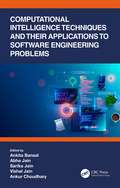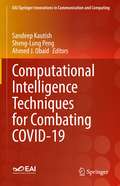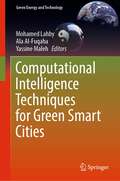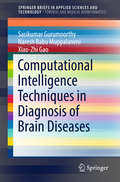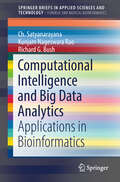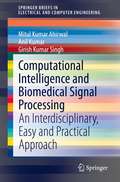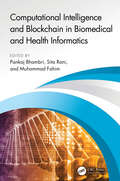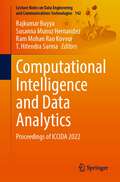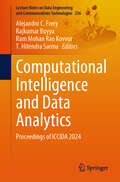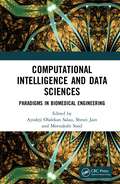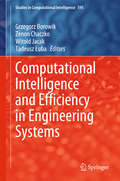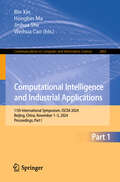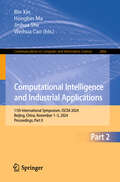- Table View
- List View
Computational Intelligence Methods for Bioinformatics and Biostatistics: 16th International Meeting, CIBB 2019, Bergamo, Italy, September 4–6, 2019, Revised Selected Papers (Lecture Notes in Computer Science #12313)
by Luca Manzoni Paolo Cazzaniga Daniela Besozzi Ivan MerelliThis book constitutes revised selected papers from the 16th International Meeting on Computational Intelligence Methods for Bioinformatics and Biostatistics, CIBB 2019, which was held in Bergamo, Italy, during September 4-6, 2019. The 28 full papers presented in this volume were carefully reviewed and selected from 55 submissions. The papers are grouped in topical sections as follows: Computational Intelligence Methods for Bioinformatics and Biostatistics; Algebraic and Computational Methods for the Study of RNA Behaviour; Intelligence methods for molecular characterization medicine; Machine Learning in Healthcare Informatics and Medical Biology; Modeling and Simulation Methods for Computational Biology and Systems Medicine.
Computational Intelligence Methods for Bioinformatics and Biostatistics: 17th International Meeting, CIBB 2021, Virtual Event, November 15–17, 2021, Revised Selected Papers (Lecture Notes in Computer Science #13483)
by Paolo Cazzaniga Davide Chicco Angelo Facchiano Erica Tavazzi Enrico Longato Martina Vettoretti Anna Bernasconi Simone AvesaniThis book constitutes revised selected papers from the 17th International Meeting on Computational Intelligence Methods for Bioinformatics and Biostatistics, CIBB 2021, which was held virtually during November 15–17, 2021. The 19 papers included in these proceedings were carefully reviewed and selected from 26 submissions, and they focus on bioinformatics, computational biology, health informatics, cheminformatics, biotechnology, biostatistics, and biomedical imaging.
Computational Intelligence Methods for Bioinformatics and Biostatistics: 18th International Meeting, CIBB 2023, Padova, Italy, September 6–8, 2023, Revised Selected Papers (Lecture Notes in Computer Science #14513)
by Erica Tavazzi Enrico Longato Martina Vettoretti Giacomo Baruzzo Massimo BellatoThe book constitutes the refereed post-conference proceedings of the 18th International Meeting on Computational Intelligence Methods for Bioinformatics and Biostatistics, CIBB 2023, held in Padova, Italy, during September 6–8, 2023. The 23 full papers presented in these proceedings were carefully reviewed and selected from 24 submissions. They focuses on topics such as machine learning in healthcare informatics and medical biology; machine learning explainability in medical imaging; prediction uncertainty in machine learning; advanced statistical and computational methodologies for single-cell omics data; present and future research in bioinformatics; distributed computing in bioinformatics and computational biology; and modelling and simulation methods for computational biology and systems medicine.
Computational Intelligence Methods for Bioinformatics and Biostatistics: 19th International Meeting, CIBB 2024, Benevento, Italy, September 4–6, 2024, Revised Selected Papers (Lecture Notes in Computer Science #15276)
by Luigi Cerulo Francesco Napolitano Francesco Bardozzo Lu Cheng Annalisa Occhipinti Stefano M. PagnottaThis volume LNCS 15276 constitutes the revised selected papers of the 19th International Meeting on Computational Intelligence Methods for Bioinformatics and Biostatistics, CIBB 2024, held in Benevento, Italy, during September 4–6, 2024. The 24 full papers and 3 short papers were carefully reviewed and selected from 28 submissions. They were organized in the following topical sections: Bioinformatics; Medical Informatics; Natural Language Processing (NLP) and Large Language Models (LLM) for Unstructured Data in Health Informatics; Modeling and Simulation Methods for Computational Biology and Systems Medicine; Machine Learning for Structured Data in Clinical Informatics and Medical Biology; Computational Intelligence in Personalized Medicine; and Computational Structural Bioinformatics.
Computational Intelligence Methods for Green Technology and Sustainable Development: Proceedings of the International Conference GTSD2020 (Advances in Intelligent Systems and Computing #1284)
by Yo-Ping Huang Wen-June Wang Hoang An Quoc Le Hieu Giang Nguyen-Le HungThis book is a selected collection of 54 peer-reviewed original scientific research papers of the 5th International Conference on Green Technology and Sustainable Development (GTSD2020) organised in Vietnam in 2020. It highlights the importance of sustainability as well as promotes up-to-date innovation and research for green development in technologies, economics and education among countries. The conference provides an international platform for researchers, practitioners, policymakers and entrepreneurs to present their advances, knowledge and experience on various interdisciplinary topics related to the theme of “Green technology and sustainable development in industrial revolution 4.0”.The book is a valuable resource for researchers, analysts, engineers, practitioners and policymakers who are interested in the latest findings in artificial intelligence, cyber systems, robotics, green energy and power systems, mechanical and computational mechanic models and advanced civil engineering. This book has 05 sessions consisting of both theoretical and practical aspects, and numerical and experimental analyses in various engineering disciplines.
Computational Intelligence Methods for Green Technology and Sustainable Development: Proceedings of the International Conference GTSD2022 (Lecture Notes in Networks and Systems #567)
by Yo-Ping Huang Wen-June Wang Hoang An Quoc Hieu-Giang Le Hoai-Nam QuachThis book provides readers with peer-reviewed research papers presented at the 6th International Conference on Green Technology and Sustainable Development (GTSD) held in Nha Trang City, Vietnam, from July 29 to 30, 2022. The book is original work of researchers from academia and industry focusing on the theme “Green technology and sustainable development in Industrial Revolution 4.0” not only to raise awareness of the vital importance of sustainability in education, technology, and economic development, but also to highlight the essential roles of technology innovation for the green future. The book presents a wide range of research aspects including energy engineering, electric power systems, renewable energy systems, automatic control engineering, robotics, vehicle engineering, material engineering, construction engineering, mechanical engineering, vibrations, computational analysis, numerical investigation, system failure, technological solutions in health care, and so on. Through thorough research basing on both experimental and numerical methods, the authors feature either solutions for existing problems or optimization and improvement for performance of existing methods. The collected research results could be useful alternatives and implications for industry experts, research institutions, universities, and all others who share a common interest in the future global sustainable development.
Computational Intelligence Methods for Green Technology and Sustainable Development: Proceedings of the International Conference GTSD2024, Volume 1 (Lecture Notes in Networks and Systems #1195)
by Yo-Ping Huang Wen-June Wang Hieu-Giang Le An-Quoc HoangThis book is presented in two volumes, featuring peer-reviewed research papers from the 7th International Conference on Green Technology and Sustainable Development (GTSD), held in Ho Chi Minh City, Vietnam, from July 25 to 26, 2024. It highlights original research by experts from both academia and industry, centered on the theme of "Green Technology and Sustainable Development in the Industrial Revolution 4.0." The book underscores the critical importance of sustainability in education, technology, and economic development, while also showcasing the vital role of technological innovation in creating a greener future. The papers documented in this book cover a broad range of topics, including renewable energy systems, smart grids, artificial intelligence, robotics and intelligent systems, and computational intelligence, all with a focus on sustainable development, climate change mitigation, and environmental policy. These studies showcase cutting-edge technologies and innovative ideas related to green technology, offering actionable insights for advancing sustainable development across various sectors. The authors present research based on both experimental and numerical methods, offering solutions to current problems and optimizing existing methods. The insights and findings provided are valuable for industry experts, research institutions, universities, and anyone interested in advancing global sustainable development.
Computational Intelligence Methods for Green Technology and Sustainable Development: Proceedings of the International Conference GTSD2024, Volume 2 (Lecture Notes in Networks and Systems #1199)
by Yo-Ping Huang Wen-June Wang Hieu-Giang Le An-Quoc HoangThis book is presented in two volumes, featuring peer-reviewed research papers from the 7th International Conference on Green Technology and Sustainable Development (GTSD), held in Ho Chi Minh City, Vietnam, from July 25 to 26, 2024. It highlights original research by experts from both academia and industry, centered on the theme of "Green Technology and Sustainable Development in the Industrial Revolution 4.0." The book underscores the critical importance of sustainability in education, technology, and economic development, while also showcasing the vital role of technological innovation in creating a greener future. The papers documented in this book cover a broad range of topics, including renewable energy systems, smart grids, artificial intelligence, robotics and intelligent systems, and computational intelligence, all with a focus on sustainable development, climate change mitigation, and environmental policy. These studies showcase cutting-edge technologies and innovative ideas related to green technology, offering actionable insights for advancing sustainable development across various sectors. The authors present research based on both experimental and numerical methods, offering solutions to current problems and optimizing existing methods. The insights and findings provided are valuable for industry experts, research institutions, universities, and anyone interested in advancing global sustainable development.
Computational Intelligence Methods for Super-Resolution in Image Processing Applications
by Anand Deshpande Navid Razmjooy Vania V. EstrelaThis book explores the application of deep learning techniques within a particularly difficult computational type of computer vision (CV) problem ─ super-resolution (SR). The authors present and discuss ways to apply computational intelligence (CI) methods to SR. The volume also explores the possibility of using different kinds of CV techniques to develop and enhance the tools/processes related to SR. The application areas covered include biomedical engineering, healthcare applications, medicine, histology, and material science. The book will be a valuable reference for anyone concerned with multiple multimodal images, especially professionals working in remote sensing, nanotechnology and immunology at research institutes, healthcare facilities, biotechnology institutions, agribusiness services, veterinary facilities, and universities.
Computational Intelligence Methods in COVID-19: Surveillance, Prevention, Prediction and Diagnosis (Studies in Computational Intelligence #923)
by Khalid RazaThe novel coronavirus disease 2019 (COVID-19) pandemic has posed a major threat to human life and health. This book is beneficial for interdisciplinary students, researchers, and professionals to understand COVID-19 and how computational intelligence can be used for the purpose of surveillance, control, prevention, prediction, diagnosis, and potential treatment of the disease. The book contains different aspects of COVID-19 that includes fundamental knowledge, epidemic forecast models, surveillance and tracking systems, IoT- and IoMT-based integrated systems for COVID-19, social network analysis systems for COVID-19, radiological images (CT, X-ray) based diagnosis system, and computational intelligence and in silico drug design and drug repurposing methods against COVID-19 patients. The contributing authors of this volume are experts in their fields and they are from various reputed universities and institutions across the world. This volume is a valuable and comprehensive resource for computer and data scientists, epidemiologists, radiologists, doctors, clinicians, pharmaceutical professionals, along with graduate and research students of interdisciplinary and multidisciplinary sciences.
Computational Intelligence Paradigms for Optimization Problems Using MATLAB®/SIMULINK®
by S. Sumathi L. Ashok Kumar Surekha. PConsidered one of the most innovative research directions, computational intelligence (CI) embraces techniques that use global search optimization, machine learning, approximate reasoning, and connectionist systems to develop efficient, robust, and easy-to-use solutions amidst multiple decision variables, complex constraints, and tumultuous environments. CI techniques involve a combination of learning, adaptation, and evolution used for intelligent applications. Computational Intelligence Paradigms for Optimization Problems Using MATLAB®/ Simulink® explores the performance of CI in terms of knowledge representation, adaptability, optimality, and processing speed for different real-world optimization problems. Focusing on the practical implementation of CI techniques, this book: Discusses the role of CI paradigms in engineering applications such as unit commitment and economic load dispatch, harmonic reduction, load frequency control and automatic voltage regulation, job shop scheduling, multidepot vehicle routing, and digital image watermarking Explains the impact of CI on power systems, control systems, industrial automation, and image processing through the above-mentioned applications Shows how to apply CI algorithms to constraint-based optimization problems using MATLAB® m-files and Simulink® models Includes experimental analyses and results of test systems Computational Intelligence Paradigms for Optimization Problems Using MATLAB®/ Simulink® provides a valuable reference for industry professionals and advanced undergraduate, postgraduate, and research students.
Computational Intelligence Paradigms: Theory & Applications using MATLAB
by S. Sumathi Surekha PaneerselvamOffering a wide range of programming examples implemented in MATLAB, Computational Intelligence Paradigms: Theory and Applications Using MATLAB presents theoretical concepts and a general framework for computational intelligence (CI) approaches, including artificial neural networks, fuzzy systems, evolutionary computation, genetic algorithms and pr
Computational Intelligence Techniques and Their Applications to Software Engineering Problems (Computational Intelligence Techniques)
by Vishal Jain Sarika Jain Ankita Bansal Abha Jain Ankur ChoudharyComputational Intelligence Techniques and Their Applications to Software Engineering Problems focuses on computational intelligence approaches as applicable in varied areas of software engineering such as software requirement prioritization, cost estimation, reliability assessment, defect prediction, maintainability and quality prediction, size estimation, vulnerability prediction, test case selection and prioritization, and much more. The concepts of expert systems, case-based reasoning, fuzzy logic, genetic algorithms, swarm computing, and rough sets are introduced with their applications in software engineering. The field of knowledge discovery is explored using neural networks and data mining techniques by determining the underlying and hidden patterns in software data sets. Aimed at graduate students and researchers in computer science engineering, software engineering, information technology, this book: Covers various aspects of in-depth solutions of software engineering problems using computational intelligence techniques Discusses the latest evolutionary approaches to preliminary theory of different solve optimization problems under software engineering domain Covers heuristic as well as meta-heuristic algorithms designed to provide better and optimized solutions Illustrates applications including software requirement prioritization, software cost estimation, reliability assessment, software defect prediction, and more Highlights swarm intelligence-based optimization solutions for software testing and reliability problems
Computational Intelligence Techniques for Combating COVID-19 (EAI/Springer Innovations in Communication and Computing)
by Sheng-Lung Peng Sandeep Kautish Ahmed J. ObaidThis book presents the latest cutting edge research, theoretical methods, and novel applications in the field of computational intelligence and computational biological approaches that are aiming to combat COVID-19. The book gives the technological key drivers behind using AI to find drugs that target the virus, shedding light on the structure of COVID-19, detecting the outbreak and spread of new diseases, spotting signs of a COVID-19 infection in medical images, monitoring how the virus and lockdown is affecting mental health, and forecasting how COVID-19 cases and deaths will spread across cities and why. Further, the book helps readers understand computational intelligence techniques combating COVID-19 in a simple and systematic way.
Computational Intelligence Techniques for Green Smart Cities (Green Energy and Technology)
by Ala Al-Fuqaha Yassine Maleh Mohamed LahbyThis book contains high-quality and original research on computational intelligence for green smart cities research. In recent years, the use of smart city technology has rapidly increased through the successful development and deployment of Internet of Things (IoT) architectures. The citizens' quality of life has been improved in several sensitive areas of the city, such as transportation, buildings, health care, education, environment, and security, thanks to these technological advancesComputational intelligence techniques and algorithms enable a computational analysis of enormous data sets to reveal patterns that recur. This information is used to inform and improve decision-making at the municipal level to build smart computational intelligence techniques and sustainable cities for their citizens. Machine intelligence allows us to identify trends (patterns). The smart city could better integrate its transportation network, for example. By offering a better public transportation network adapted to the demand, we could reduce personal vehicles and energy consumption. A smart city could use models to predict the consequences of a change, such as pedestrianizing a street or adding a bike lane. A city can even create a 3D digital twin to test hypothetical projects. This book comprises many state-of-the-art contributions from scientists and practitioners working in machine intelligence and green smart cities. It aspires to provide a relevant reference for students, researchers, engineers, and professionals working in this area or those interested in grasping its diverse facets and exploring the latest advances in machine intelligence for green and sustainable smart city applications.
Computational Intelligence Techniques in Diagnosis of Brain Diseases (SpringerBriefs in Applied Sciences and Technology)
by Xiao-Zhi Gao Naresh Babu Muppalaneni Sasikumar GurumoorthyThis book highlights a new biomedical signal processing method of extracting a specific underlying signal from possibly noisy multi-channel recordings, and shows that the method is suitable for extracting independent components from the measured electroencephalogram (EEG) signal. The system efficiently extracts memory spindles and is also effective in Alzheimer seizures. Current developments in computer hardware and signal processing have made it possible for EEG signals or "brain waves" to communicate between humans and computers - an area that can be extended for use in this domain.
Computational Intelligence and Big Data Analytics: Applications in Bioinformatics (SpringerBriefs in Applied Sciences and Technology)
by Ch. Satyanarayana Kunjam Nageswara Rao Richard G. BushThis book highlights major issues related to big data analysis using computational intelligence techniques, mostly interdisciplinary in nature. It comprises chapters on computational intelligence technologies, such as neural networks and learning algorithms, evolutionary computation, fuzzy systems and other emerging techniques in data science and big data, ranging from methodologies, theory and algorithms for handling big data, to their applications in bioinformatics and related disciplines. The book describes the latest solutions, scientific results and methods in solving intriguing problems in the fields of big data analytics, intelligent agents and computational intelligence. It reflects the state of the art research in the field and novel applications of new processing techniques in computer science. This book is useful to both doctoral students and researchers from computer science and engineering fields and bioinformatics related domains.
Computational Intelligence and Biomedical Signal Processing: An Interdisciplinary, Easy and Practical Approach (SpringerBriefs in Electrical and Computer Engineering)
by Anil Kumar Mitul Kumar Ahirwal Girish Kumar SinghThis book presents an interdisciplinary paradigms of computational intelligence techniques and biomedical signal processing. The computational intelligence techniques outlined in the book will help to develop various ways to enhance and utilize signal processing algorithms in the field of biomedical signal processing. In this book, authors have discussed research, discoveries and innovations in computational intelligence, signal processing, and biomedical engineering that will be beneficial to engineers working in the field of health care systems. The book provides fundamental and initial level theory and implementation tools, so that readers can quickly start their research in these interdisciplinary domains.
Computational Intelligence and Blockchain in Biomedical and Health Informatics
by Pankaj Bhambri Sita Rani Muhammad FahimAdvancements in computational intelligence, which encompasses artificial intelligence, machine learning, and data analytics, have revolutionized the way we process and analyze biomedical and health data. These techniques offer novel approaches to understanding complex biological systems, improving disease diagnosis, optimizing treatment plans, and enhancing patient outcomes. Computational Intelligence and Blockchain in Biomedical and Health Informatics introduces the role of computational intelligence and blockchain in the biomedical and health informatics fields and provides a framework and summary of the various methods. The book emphasizes the role of advanced computational techniques and offers demonstrative examples throughout. Techniques to analyze the impacts on the biomedical and health Informatics domains are discussed along with major challenges in deployment. Rounding out the book are highlights of the transformative potential of computational intelligence and blockchain in addressing critical issues in healthcare from disease diagnosis and personalized medicine to health data management and interoperability along with two case studies. This book is highly beneficial to educators, researchers, and anyone involved with health data.Features:• Introduces the role of computational intelligence and blockchain in the biomedical and health informatics fields.• Provides a framework and a summary of various computational intelligence and blockchain methods.• Emphasizes the role of advanced computational techniques and offers demonstrative examples throughout.• Techniques to analyze the impact on biomedical and health informatics are discussed along with major challenges in deployment.• Highlights the transformative potential of computational intelligence and blockchain in addressing critical issues in healthcare from disease diagnosis and personalized medicine to health data management and interoperability.
Computational Intelligence and Data Analytics: Proceedings of ICCIDA 2022 (Lecture Notes on Data Engineering and Communications Technologies #142)
by Rajkumar Buyya T. Hitendra Sarma Ram Mohan Rao Kovvur Susanna Munoz HernandezThe book presents high-quality research papers presented at the International Conference on Computational Intelligence and Data Analytics (ICCIDA 2022), organized by the Department of Information Technology, Vasavi College of Engineering, Hyderabad, India in January 2022. ICCIDA provides an excellent platform for exchanging knowledge with the global community of scientists, engineers, and educators. This volume covers cutting-edge research in two prominent areas – computational intelligence and data analytics, and allied research areas.
Computational Intelligence and Data Analytics: Proceedings of ICCIDA 2024 (Lecture Notes on Data Engineering and Communications Technologies #236)
by Alejandro C. Frery Rajkumar Buyya T. Hitendra Sarma Ram Mohan Rao KovvurThis book presents high-quality research papers presented at the International Conference on Computational Intelligence and Data Analytics (ICCIDA 2024), organized by the Department of Information Technology, Vasavi College of Engineering, Hyderabad, India, in June 2024. ICCIDA provides an excellent platform for exchanging knowledge with the global community of scientists, engineers, and educators. This book covers cutting-edge research in two prominent areas—computational intelligence and data analytics and allied research areas.
Computational Intelligence and Data Sciences: Paradigms in Biomedical Engineering
by Ayodeji Olalekan Salau, Shruti Jain, Meenakshi SoodThis book presents futuristic trends in computational intelligence including algorithms as applicable to different application domains in health informatics covering bio-medical, bioinformatics, and biological sciences. Latest evolutionary approaches to solve optimization problems under biomedical engineering field are discussed. It provides conceptual framework with a focus on application of computational intelligence techniques in the domain of biomedical engineering and health informatics including real-time issues.
Computational Intelligence and Efficiency in Engineering Systems (Studies in Computational Intelligence #595)
by Grzegorz Borowik Zenon Chaczko Witold Jacak Tadeusz ŁubaThis carefully edited and reviewed volume addresses the increasingly popular demand for seeking more clarity in the data that we are immersed in. It offers excellent examples of the intelligent ubiquitous computation, as well as recent advances in systems engineering and informatics. The content represents state-of-the-art foundations for researchers in the domain of modern computation, computer science, system engineering and networking, with many examples that are set in industrial application context. The book includes the carefully selected best contributions to APCASE 2014, the 2nd Asia-Pacific Conference on Computer Aided System Engineering, held February 10-12, 2014 in South Kuta, Bali, Indonesia. The book consists of four main parts that cover data-oriented engineering science research in a wide range of applications: computational models and knowledge discovery; communications networks and cloud computing; computer-based systems; and data-oriented and software-intensive systems.
Computational Intelligence and Industrial Applications: 11th International Symposium, ISCIIA 2024, Beijing, China, November 1–5, 2024, Proceedings, Part I (Communications in Computer and Information Science #2465)
by Hongbin Ma Weihua Cao Jinhua She Bin XinThis two-volume set CCIS 2465-2466, constitutes of the proceedings of 11th International Symposium on Computational Intelligence and Industrial Applications, ISCIIA 2024, held in Beijing, China, during November 1–5, 2024. The 55 full papers and 5 short papers included in this volume were carefully reviewed and selected from 135 submissions. The topics cover the following fields connected to computational intelligence and intelligent informatics: intelligent information processing, pattern recognition and computer vision, intelligent optimization and decision-making, advanced control, multi-agent systems, robotics and various applications of computational intelligence methods such as neural networks, fuzzy reasoning, evolutionary computing, machine learning and<span style="font-size: 12.0pt; lin
Computational Intelligence and Industrial Applications: 11th International Symposium, ISCIIA 2024, Beijing, China, November 1–5, 2024, Proceedings, Part II (Communications in Computer and Information Science #2466)
by Hongbin Ma Weihua Cao Jinhua She Bin XinThis two-volume set CCIS 2465-2466, constitutes of the proceedings of 11th International Symposium on Computational Intelligence and Industrial Applications, ISCIIA 2024, held in Beijing, China, during November 1–5, 2024. The 55 full papers and 5 short papers included in this volume were carefully reviewed and selected from 135 submissions. The topics cover the following fields connected to computational intelligence and intelligent informatics: intelligent information processing, pattern recognition and computer vision, intelligent optimization and decision-making, advanced control, multi-agent systems, robotics and various applications of computational intelligence methods such as neural networks, fuzzy reasoning, evolutionary computing, machine learning and<span style="font-size: 12.0pt; line-heigh
